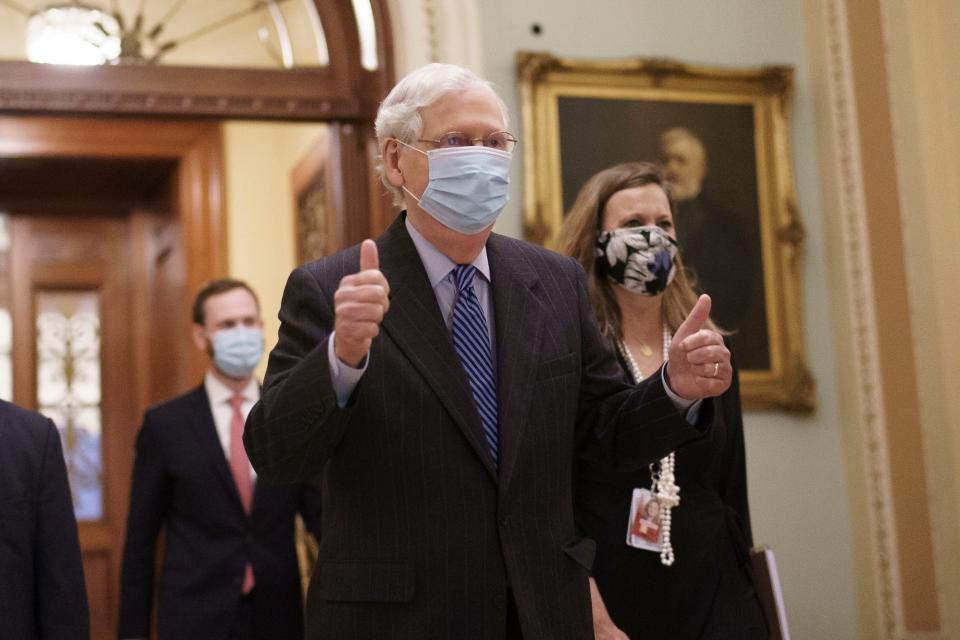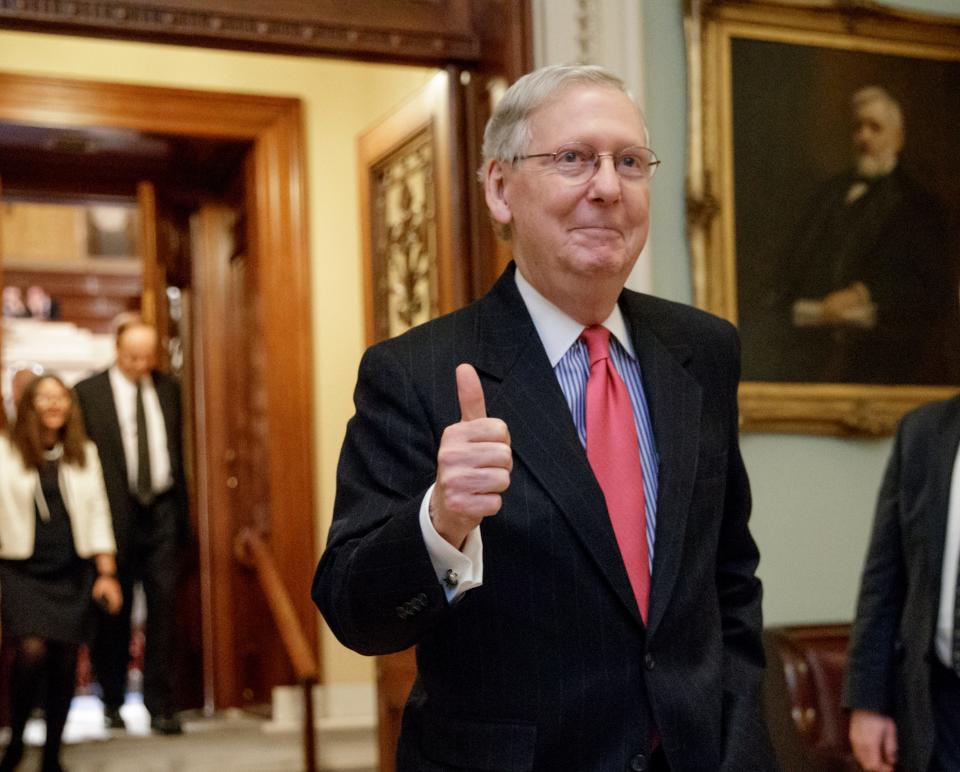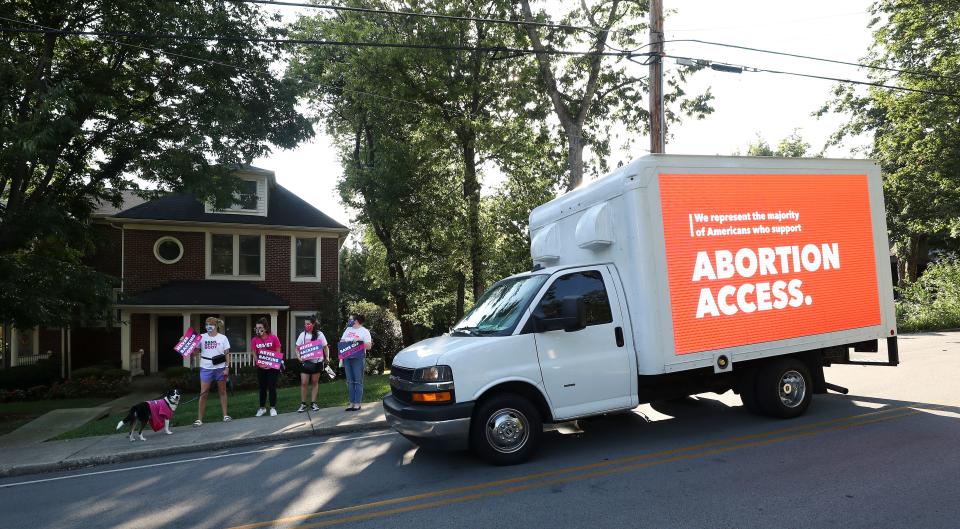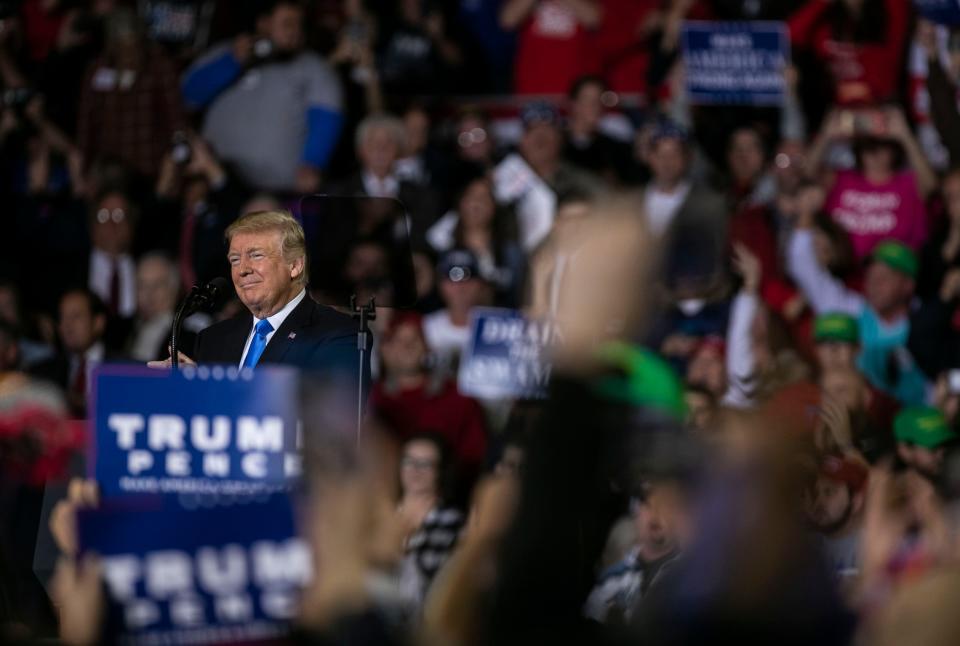How Mitch McConnell helped engineer the fall of Roe v. Wade and cement his abortion legacy
- Oops!Something went wrong.Please try again later.
- Oops!Something went wrong.Please try again later.
LOUISVILLE, Ky. — When historians look back at the architects of the fall of Roe v. Wade, U.S. Sen. Mitch McConnell will be near the top of the list.
McConnell helped bring down Roe — a decades-long goal of anti-abortion activists — by leveraging his leading role in the U.S. Senate to reshape the federal judiciary and the U.S. Supreme Court.
His legacy now includes the rollback of a nearly half-century-old constitutional right to abortion, which six Supreme Court justices — three of whom McConnell steered through the Senate confirmation gauntlet — have ruled never should have existed.
This ruling directly impacts McConnell's home state of Kentucky, where Roe's reversal triggered a near-total abortion ban, courtesy of a law the Republican-controlled state legislature passed in 2019.
Roe v. Wade is overturned: Here's what abortion laws look like in each state
Experts say such abortion bans will most heavily affect poorer people who can't afford to travel hundreds of miles to a state such as Illinois where abortion remains legal.
And Kentucky is one of the top 10 states with the highest percentage of people in poverty. One in seven Kentuckians lives in poverty.
"The Supreme Court’s landmark ruling in Dobbs is courageous and correct," Kentucky's longtime senator said in a statement Friday after the ruling came down.
"Millions of Americans have spent half a century praying, marching, and working toward today’s historic victories for the rule of law and for innocent life. I have been proud to stand with them throughout our long journey, and I share their joy today."
A national anti-abortion organization, Susan B. Anthony Pro-Life America, praised McConnell this month as a hero for his judicial work, which paid off in a big way with the court's ruling on Roe v. Wade.
"Leader McConnell’s vision and courage have been critical to some of the biggest pro-life victories: the successful confirmation of three outstanding Supreme Court justices and over 200 federal court judges," the organization's president, Marjorie Dannenfelser, said in a statement.
"Without his unwavering determination, we wouldn’t be where we are today, poised to save countless lives through the democratic process. Heroes like McConnell will continue to be instrumental in the next, new phase of the pro-life movement."
For subscribers: Here is what happens to abortion in Kentucky now that the Supreme Court has overturned Roe
McConnell froze out former President Barack Obama's Supreme Court nominee, Merrick Garland, after Justice Antonin Scalia died in 2016 — a decision that impacted that year's presidential election, which former President Donald Trump went on to win.
Three months after the new president's inauguration, the McConnell-led Senate confirmed Justice Neil Gorsuch. Then Justice Anthony Kennedy's 2018 retirement led to the confirmation of Justice Brett Kavanaugh, whom McConnell supported even though he was accused of sexual assault.
Last but not least came Justice Amy Coney Barrett. Justice Ruth Bader Ginsburg died less than two months before the 2020 presidential election, and McConnell made sure Barrett got confirmed before Election Day — after denying Obama the same opportunity. Barrett's confirmation gave Republican-nominated justices a supermajority on the nine-member court, and that supermajority just nixed the nationwide right to abortion.
His actions earned the scorn of Jessica Loving, a former head of the Kentucky Commission on Women and the ACLU of Kentucky, who said McConnell has been "instrumental in dismantling a lot of progress that had been made with civil rights and civil liberties in this country."
"I don’t think (the) dismantling of women’s reproductive rights was somehow a goal of Mitch’s from the beginning," Loving told The Courier Journal, adding that McConnell stymied some proposed abortion restrictions as a Jefferson County official in the late 1970s.
"I think it was a consequence of choices he made along the way, in terms of appeasing the individuals and organizations who supported his campaign because it was part of their agenda."
Abortion in Kentucky: Abortion ends in Kentucky as Supreme Court strikes down Roe v. Wade due to trigger law
U.S. Rep. John Yarmuth, a Louisville Democrat who has known McConnell for decades, agreed, theorizing that reversing Roe was more useful for Republicans as a perennially unfulfilled goal the party could use to mobilize voters than as an accomplished feat.
He expects the reversal of Roe will radically change the dynamics of abortion politics.
McConnell was a more progressive member of the GOP when they met as young Republicans more than 50 years ago, according to Yarmuth, although he said McConnell "denies that he was ever pro-choice."
Regardless, Yarmuth indicated this ruling — and the largely conservative Supreme Court that handed it down — is now a pivotal piece of McConnell's legacy.
And he posted a harsh prediction Friday of what that legacy's impact will be: "Let's be clear: This means people will suffer. It means women will die."

Reactions and updates from Louisville: Supreme Court overturns Roe v. Wade abortion ruling
Today, six of the court's nine justices were nominated by a Republican president, and McConnell managed the confirmation process for half of them.
Scott Jennings, a Courier Journal columnist who was an adviser for McConnell on past reelection campaigns, said he doubts the senator thinks about specific, future rulings when handling judicial confirmations.
"I think he’s thinking about: Do these justices fit my philosophy of strict adherence to the Constitution and a conservative view of what it means to be a judge?" he said.
"I just think he's one of the pillars of the modern conservative judicial movement."
Whether people agree or disagree with McConnell's successful efforts to reshape the Supreme Court, University of Louisville law professor Samuel Marcosson said it's just a fact that this is a huge part of the Kentuckian's legacy.
"It would be almost overlooking the obvious to not see it as one of the most important things that will be talked about when people remember and reflect on Mitch McConnell’s career," he said.
McConnell's strategy helps upend Roe
Three years ago, Susan B. Anthony Pro-Life America gave McConnell its Distinguished Leader Award, prominently citing his work to confirm a score of Republican nominees to lifetime judgeships — including, by that point, two Supreme Court justices.
McConnell, who led the four-year charge to confirm well over 200 judges nominated by former President Donald Trump while the GOP controlled the Senate, told the audience at the organization's 2019 gala: “These victories are already paying early dividends. They’ll keep paying dividends for decades to come, really for a generation or more."
A year and change later, McConnell seized a sudden opportunity: Justice Ruth Bader Ginsburg's death, less than two months before the 2020 presidential election, gave his party the chance to confirm a third Trump nominee to the Supreme Court.
McConnell helped ensure Barrett joined the court before the November 2020 presidential election, which Trump lost to President Joe Biden.

McConnell called Barrett's confirmation a "capstone" to his and the Trump administration's relentless work to transform the federal judiciary.
"They did something unique in American history," Marcosson said of McConnell and Trump.
That's partly because judicial confirmations became more contentious, and more partisan, over the past couple decades, Marcosson said. Now, a president must rely on a determined Senate majority leader’s aid to get judges confirmed — and McConnell was "more than happy to play that role."
He even arranged a huge change to the Senate's rules for confirming Supreme Court justices to eliminate the filibuster, with the support of his fellow Republican senators, so they could greenlight Trump's nominees despite Democratic senators' opposition.

And in what he later called the "most consequential thing I've ever done," McConnell blocked then-President Barack Obama's Supreme Court nominee after Scalia died.
"By keeping that seat open … that set the stage for the court to be completely reshaped," Marcosson said.
McConnell's gambit turned Scalia's seat into a political issue for presidential candidates. Trump, who said he'd pick justices willing to overturn Roe v. Wade, won that year's election.
Without McConnell's "vision" on leaving that seat open after Scalia — his longtime friend — died, "we wouldn't be having this conversation" about Roe v. Wade and the senator's legacy, Jennings told The Courier Journal.
"In fact, I'm not even sure Donald Trump would have ever become the president," he said. "Truly this era is the McConnell era, not just on the court but maybe generally politically."

And on Friday morning, the trio of Trump-nominated justices ruled with Justices Samuel Alito, Clarence Thomas and John Roberts — all of whom were nominated by Republican presidents and whose confirmations McConnell supported — to overturn Roe v. Wade.
This isn't the first time the Supreme Court has had a conservative supermajority, but overturning Roe is a huge move.
"It is extraordinarily rare for the court … in a decision overruling a prior decision, to restrict a right that the court had recognized," Marcosson, the U of L law professor, said.
When discussing 'conservative' or 'liberal' judges, Marcosson there isn't a perfect correlation between that and being politically conservative or liberal. But there is overlap.
If many of a liberal justice's rulings coincide with liberal political outcomes, for example, he said "we shouldn't be surprised that they see the law in a certain way, they read the law in a certain way, and it leads them to certain conclusions that are also favorable to their particular politics.
"And the same is true for conservatives."
McConnell's early approach to abortion
Given what McConnell's maneuvering just made possible, you might not expect the senator to ever have been of help to abortion rights advocates.
But Loving, the former executive director of the ACLU of Kentucky, said that's exactly what he did in the late '70s when he served in his first elected position as Jefferson County's judge-executive.
Roe v. Wade was the fairly new law of the land, and Loving (who led the ACLU then) said anti-abortion activists already were pushing to adopt various local restrictions on abortion access.
"In the words of our lawyers … and in the words of McConnell at the time, they flew in the face of Roe v. Wade," Loving said, noting that she remembers the 30-something lawyer understood the legal, constitutional and ethical issues involved.
"That was the beginning of the attempts to put restrictions on access to abortion (post-Roe) … and that has continued ever since, with varying degrees of success."
Those early efforts found little success in Jefferson County, Loving said, because McConnell kept most of the proposals bottled up in committee.
"And that was when I realized how brilliant Mitch was, and still is, at using the procedural process to thwart legislation," she said.
The Courier Journal archives show McConnell did vote for a county ordinance in 1978 that added restrictions on local abortion services, including largely prohibiting hospitals that got local government funding from providing abortions. (The legislation was struck down in court.)
He didn't earn the endorsement of the Kentucky Right to Life Association's PAC in his first Senate race in 1984, but a group spokesperson back then did say McConnell had "a good pro-life record."
Loving said she noticed a marked change in McConnell's approach to abortion issues once he ran for Congress (and won) that year.
"It looks as if that was when he made his choice, or soon thereafter when he was elected, to tie his fate to the support of what we then called the 'Religious Right,' which was a coalition of far-right-wing groups that were very reactionary on social justice issues," she said.
"It was a mutually beneficial situation where the senator’s imprimatur gave credibility to those organizations," she continued. "I've always believed that it was people like Sen. McConnell, and especially Mitch, who allowed those organizations to gain a very strong power base …"

McConnell solidly anti-abortion while in Congress
McConnell has a solid, decades-long record of supporting anti-abortion legislation on Capitol Hill.
For example, he voted for a 2003 law Congress passed with bipartisan support that banned a relatively uncommon abortion procedure used after the first trimester of pregnancy.
The Supreme Court upheld that law in 2007, the year after Alito — who went on to write the ruling overturning Roe v. Wade — joined the bench.
McConnell also held "show votes" on anti-abortion legislation that lacked enough support to pass the Senate in 2018 and 2020, ahead of those years' congressional elections.
And he has been credited with helping turn Kentucky into a Republican stronghold, impacting access to abortion in the commonwealth.
When his party won a majority of seats in the Kentucky House of Representatives for the first time in almost a century in 2016, it cleared the path for conservative lawmakers to pass a host of anti-abortion bills.
That included the trigger ban that now prohibits almost all abortions in the commonwealth once Roe v. Wade was overturned.
The fall of Roe v. Wade is a major symbol of the transformation McConnell helped bring to the Supreme Court.
Marcosson expects it won't be the last.
"I don't think it's going to be, by any stretch of the imagination, the only earthquake-sized change we see," he said. “It’s the big moment, but we should be prepared for a lot more moments in the future.”

Morgan Watkins is The Courier Journal's chief political reporter. Contact her at mwatkins@courierjournal.com. Follow her on Twitter: @morganwatkins26.
This article originally appeared on Louisville Courier Journal: Why the fall of Roe v Wade looms large on Mitch McConnell's legacy

